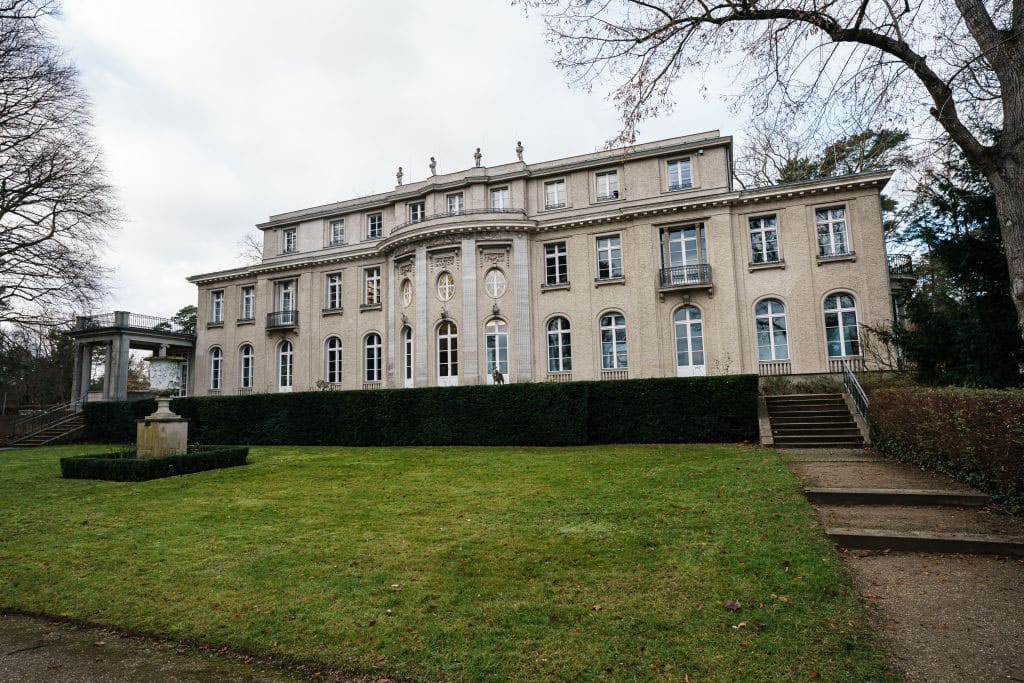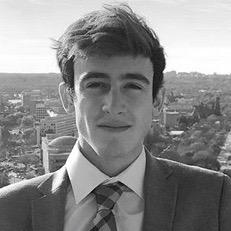 A general view of the building on the occasion of a visit of German President Frank-Walter Steinmeier (not in the picture) to the Wannsee Conference memorial on January 18, 2022 in Berlin, Germany. (Photo by Clemens Bilan – Pool / Getty Images)
A general view of the building on the occasion of a visit of German President Frank-Walter Steinmeier (not in the picture) to the Wannsee Conference memorial on January 18, 2022 in Berlin, Germany. (Photo by Clemens Bilan – Pool / Getty Images) Several weeks ago, I had the privilege of spending the week in Berlin. I was meant to go with a friend until my dad arrived several days later, but unfortunately, a family emergency rendered the trip a solo venture for a short while, which I must admit, I was originally apprehensive about. Touring the streets of Germany without someone to share in reflection about what I was seeing and learning felt daunting, considering I knew the trip was bound to stir up strong emotions. When wandering through the Jewish Museum, the memorial to the Murdered Jews of Europe, and strolling under the Brandenburg Gate where book-burning celebrations raged in grueling euphoria, I resorted to social media to express feelings, perhaps a tad too often.
But fortunately, my dad, a fellow student of Jewish and European history, arrived for perhaps the most dramatic moment of the trip, giving way to the most significant moment of contemplation. The two of us toured the beautiful grounds of Wannsee, a picturesque lakefront dotted with impressive estates just outside the city. But the shores are known mostly for one meeting on one day in particular. In the Winter of 1942, fourteen members of the Nazi high command gathered in the grand villa Ann Großen to meticulously organize the Final Solution to the Jewish Question: no longer disenfranchisement and deportation, but mass extermination.
Needless to say, the exhibit in the villa was somber. We took our time reading each placard, peering over the official documents collected from the site that detailed which local authorities in Nazi-occupied Europe needed to cooperate to facilitate the floodgates to Auschwitz. We listened to the speeches from Goebbels and Goering, and deeply internalized the juxtaposition of such serene, postcard-like views with perhaps the most inhuman ideas to ever spring from humanity. I concluded the tour by wrapping an Israeli flag around my shoulders outside the gates, feeling a profound sense of pride in the Jewish peoples’ national resilience in the face of such horrors.
As my dad and I sat in silence on a bench waiting to return to Berlin, a large charter bus pulled in front of us. Spilling from its doors came handsome men and women in tuxedos and gowns, laughing, cheering and starry-eyed. “Is this the right stop to go back into town?” My dad asked. One gentleman responded, “This is not the public bus, we are heading to a wedding.” We then turned to see the main event: the Wasserapartnent Wannsee, described in English as a “cozy houseboat hotel,” where fellow smartly dressed chatters queued with cocktails in hand. Charming, classical music filled the air of the front garden, while not fifty feet away, melancholy tourists, some of whom may have been Jewish, walked from where perhaps their grandparents’ death was planned to the most minute detail.
My dad and I looked at each other utterly gob smacked. My heart rate quickened, my eyes batted, in the way it happens when you are confronted with something you instantly recognize as significant. We both began to laugh. “Real-estate is real-estate,” said my dad, shaking his head, which I in the moment could only concur with in somewhat of a nervous giggle.
The next day the moment stuck with me, as my dad and I toured the Sachsenhausen concentration camp just north of Berlin, and later the super hip and enjoyable flea market in Mauerpark, where families grazed on schnitzel, and boom boxes blared in celebration of life. At Sachsenhausen, freedom was torn away from thousands of Jews and political prisoners of the Nazi regime, but here in Mauerpark there was an endless supply of it. It was like the Memorial to the Murdered Jews of Europe, consisting of thousands of gray slabs of concrete in the epicenter of the city, wedged between commutes and field trips and bar crawls. Within the slabs there is an eerie silence, feelings of suffocation and confusion, while just barely outside, tourists pose and plan the next techno club to hit.
While watching a beaming dancer cartwheel and split on the freshly mowed grass, donned in a “Free Palestine” tee, I suddenly began to refine what I had been thinking throughout my time in Berlin. Sure, as my dad had said, real estate is real estate. What did I expect to find in Germany? Considering the country does a great deal to memorialize its crimes, to honor those affected and to educate its children, it would be an impossible expectation to find the descendants of Nazis perpetually remorseful, so much so that life in a European capital ceases to carry on. Yet I couldn’t square it, nonetheless. I cannot accept that the Marshall Plan, or plaques on the street in recognition of deported Jews, or newly renovated Jewish historical sites, was enough to assuage easily the most traumatic event in world history. After all, those Jewish historical sites still need to be protected by both on-duty police officers and an endless procession of metal detectors and pat-downs.
If one acknowledges that blood is thicker than water, then one, without holding all Germans responsible for the crimes of the ancestors, must also acknowledge that there are still bloodstains on the cobblestone streets of Berlin.
Before heading home, I took a moment to express some concluding thoughts online:
“I don’t feel angry at what happened then. I have been angry every day for the past decade about all that, and I don’t have much grievance left to spare. Instead, I feel angry at what is happening now. At the catch-22 of thousands of international tourists spending thousands of euros on transportation to and from the camps, on tour guides, on food and drink between depressing ventures, on SIM cards so they can document how they are feeling in the face of the destruction of European Jewry. I wonder, how many of you have been to Israel? Or Brooklyn, or Pico-Robertson or even to one of Germany’s operating synagogues? How many of you see how Jews live now, how Jews continue to live out their stories, what they teach their children? Are we just an exhibit for you, intended to impose warm feelings of relief that at least you’re never going to kill anyone for being different?
Are we just an exhibit for you, intended to impose warm feelings of relief that at least you’re never going to kill anyone for being different?
There is a scandal, unfair as it may be, of Germany continuing to be Germany. Regardless of how remorseful government officials are, there are still old folks here and dearly departed relatives buried under our feet who knew what was happening outside their well-tailored lawns. I don’t want to come back. I don’t want to hear children laughing here. I don’t want to see gays in leather on their way to the next conquest. I don’t want to regard history as a chapter in a textbook rather than a still festering open wound. This country, and this continent, is a pile of graves where even the most enlightened of people dance.”
The only regret I have during my trip to Berlin was not having the time to connect with the living, breathing Jewish community in the former Reich, the strongest vanguard against Germany standing only as a memorial to what once was. I did not spend a Shabbat dinner with them, I didn’t bow my head in a synagogue or sing in old Yiddish tunes. In other words, I didn’t take my own advice in honoring how Jews lived rather than just how they died. I am quite embarrassed over this lack of judgment, and therefore I have decided that should I return to this land of such unspeakable horror, I will place breaking bread with fellow Jews at much higher significance than touring a camp or reading about Nazis. They, quite frankly, don’t deserve the satisfaction.
Blake Flayton is the New Media Director and Columnist for the Jewish Journal.























 More news and opinions than at a Shabbat dinner, right in your inbox.
More news and opinions than at a Shabbat dinner, right in your inbox.